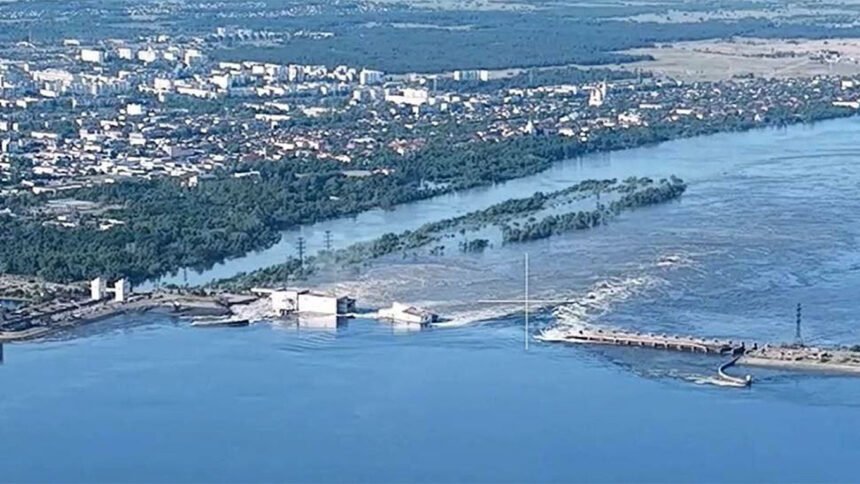The city of Nova Kakhovka in southern Ukraine, which is currently under Russian occupation, is facing a severe flood crisis, according to officials. Nova Kakhovka is known for housing the dam that has been at the center of accusations and counter-accusations between Moscow and Kyiv. Russian media reported that the city is now flooded, and Vladimir Leontyev, the head of the city administration appointed by Russia, stated that approximately 300 homes have been evacuated.
Images shown on Russian television depicted the flooded city, with the central square completely submerged and swans swimming near the main Soviet-era house of culture. Leontyev, using the messaging app Telegram, explained that the water levels were rising, and authorities were dispatching 53 buses to transport people from Nova Kakhovka and nearby settlements to safer areas. Temporary accommodation centers with hot meals were being set up, and emergency rescuers, city administration workers, and soldiers were deployed to provide assistance to those in need.
Leontyev shared a video where he stood in a high-rise building, observing the flooded central square and the Dnipro river in the background. A reporter from Russian state television, reporting from the square, mentioned that the water was rising around a statue of Lenin, which was erected by Moscow’s forces when they took control of the city at the beginning of the conflict.
The dam at the Kakhovka hydropower plant, located in southern Ukraine, has now become a casualty in the ongoing Russia-Ukraine conflict. Both countries have accused each other of attacking the dam. The destruction of the dam has resulted in the release of floodwaters in the war zone. Ukrainian authorities have expressed concerns that water levels could reach critical levels within the next five hours. Regional governor Oleksandr Prokudin, in a video on his Telegram channel, warned that the situation was escalating.
Russia has labeled the damage to the dam as a deliberate act of sabotage by Ukraine, aimed at cutting off the water supply to the Russian-held Crimean peninsula. Kremlin spokesman Dmitry Peskov stated, “We can already unequivocally declare (this was) deliberate sabotage by the Ukrainian side.”
The International Atomic Energy Agency (IAEA), the UN’s nuclear watchdog, has stated that it does not currently see any immediate nuclear safety risks. However, the IAEA is exploring options to ensure water supply for cooling the largest nuclear power plant in Europe, located in the region affected by the dam breach in southern Ukraine. The situation remains critical, and efforts are underway to mitigate the impact of the flooding and provide aid to the affected population.
